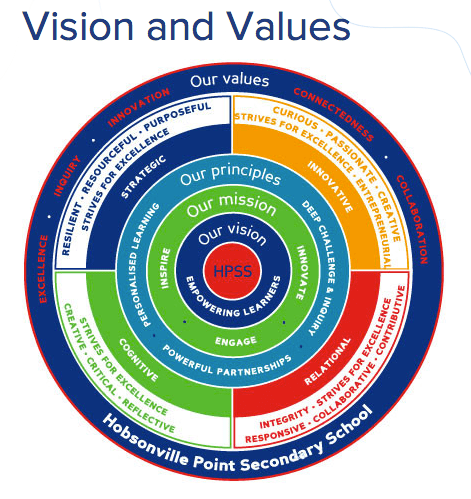I recently read The Falconer by Grant Lichtman and thoroughly encourage each of you to do the same!
It really pulled some thought threads together for me and I found myself nodding away and tweeting quotes the whole way through the book. I had read the book to try and find ways to take Design Thinking from a process to a mindset and it has absolutely helped me to do this.
I first came across the idea of Design Thinking as a pedagogical approach at the International Conference on Thinking (ICOT) last year. Ewan McIntosh spoke as the opening Keynote and completely blew me away. I quickly changed my workshop options and attended one of his workshops as well to find out more.
Over the next few months I started reading more into Design Thinking and then in Term 3 had the chance to experience a DT workshop, apply DT to the New Zealand Curriculum and develop our own Design Thinking influenced HPSS Learning Design Model.
By this stage, I was seeing the power of this approach to influence my Inquiry approach to learning. I started joining in #dtk12chat to learn from more experienced Design Thinking educators from the United States and my understanding really started to grow!
Now I was starting to investigate how to take Design Thinking past a linear sequential approach to a deeper mindset approach to learning. I asked for help doing this on twitter and Grant Lichtman suggested that I try his book The Falconer.
This book really affirmed for me some of Hobsonville Point Secondary School’s practices – particularly our multidisciplinary learning modules and the focus on developing dispositions (or Hobsonville Habits).
This is not the sort of book that I can review by giving you a list of bullet points to reflect and take action on. I guess this is why it is so long after I finished reading it that I am writing this post. I have continually pondered my learning from this ever since I finished.
I loved the focus on empowering students through developing confidence in their problem finding and problem solving abilities. But the key phrase I have taken from this book is “elegant solutions.” This phrase will definitely be a stock phrase of mine now to go alongside amplifying learning!
So, where will I be putting my lessons from The Falconer into practice?
I could look at teaching a Falconer module in future terms like the Falconer class that Grant developed this approach in.
I could have it as a My Time option for students who were really keen to develop their problem finding and solving skills.
I have my own Falconer group – my Learning Hub. They could be my focus for this.
Or more likely – some combination of all of these.
I thought I was reading this book so I could help others develop their Design Thinking mindset. Instead, The Falconer had an intangible impact on my mindset. The way I view things has shifted since reading this book in a way that will not be undone.
I have shared this book with Lea and I know that Claire has dibs on being next after her. I REALLY look forward to discussing this after they have finished reading it. Perhaps HPSS will become a Falconer school? More likely, The Falconer (and Grant Lichtman) will become more inspiring inputs that we will mould together with with our current approaches. We will continue iterating our practices and The Falconer will definitely help these iterations move towards our school vision.
I really recommend that you too read the Falconer and see how it shapes your practice for your school context.





By the way, over a one year period I tried the lessons with a group of 4th graders studying California history. Rather than the traditional approach of reading about history, we did a few of the simple exercises like studying a patch of the garden, building skills in questioning and observing. As long as we took it slowly, students at this age did not seem to be thrown at all by the abstract nature of this skill development. Using questions as our guides, the students selected guiding questions that interested them, worked in groups, shared with other groups for feedback, and built up their knowledge of history from the era we were studying. The teacher said that they had developed a much deeper understanding than the classes in the past.
Next one for my reading list. Reading “Invent to Learn” (on you recommendation) at the moment which is an inspiration. Nearly every page is folded down to revisit! Keep pushing those boundaries. I’m on the road too……but a bit behind you!
Have sent it to my kindle thanks Steve. Looking forward to touring your school as part of an ebot visit on Tuesday.
Awesome, I will keep an eye out for you!
Pingback: Developing the Characteristics of our Heroes | Steve Mouldey
Pingback: NZ US Design Thinking Chat | Steve Mouldey
Pingback: Searching for Elegant Solutions | Steve Mouldey...